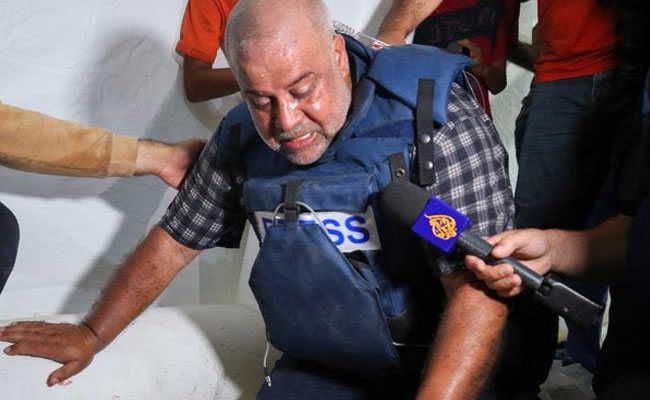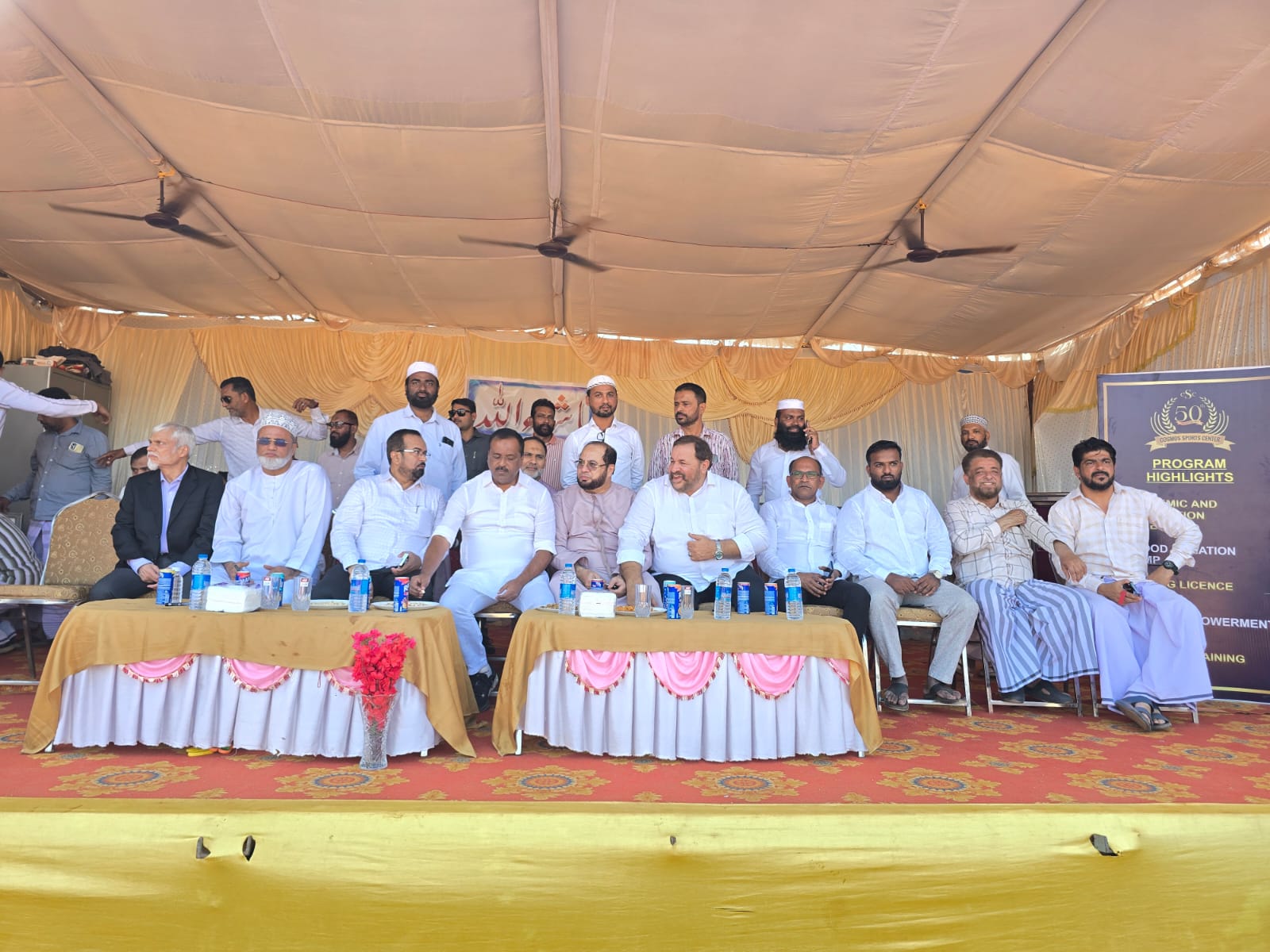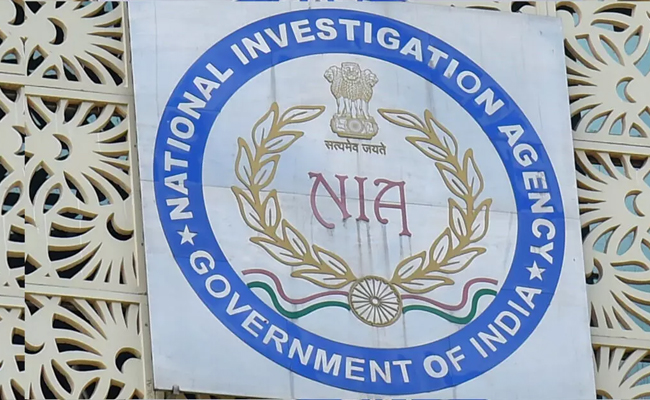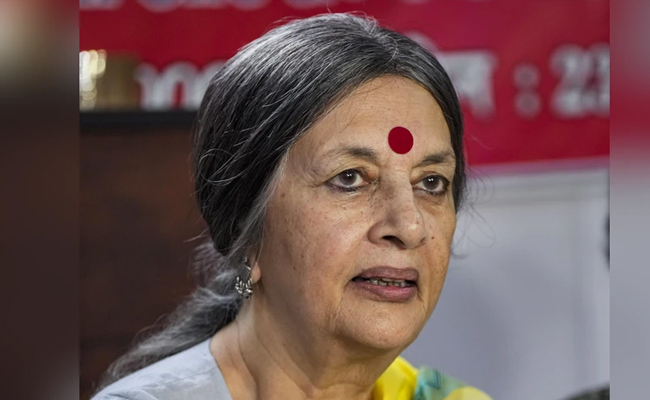Cairo: Al Jazeera's chief correspondent in the Gaza Strip, Wael Dahdouh, was helping broadcast live images of the besieged territory's night sky when he received the devastating news: His wife, son, and daughter had all been killed in an Israeli airstrike on Wednesday.
Moments later, the Qatari-based satellite channel switched to footage of Dahdouh entering al-Aqsa Hospital in Gaza before giving way to grief as he peered over the body of his dead son.
“They take revenge on us in our children?” he said, kneeling over his son’s bloodied body, still wearing his protective press vest from that day’s work.
Dahdouh’s grandson also was declared dead two hours later, the network reported.
The video was sure to reverberate across the Arab world, where the 53-year-old journalist is well-known as the face of Palestinians during many wars. He is revered in his native Gaza for telling people's stories of suffering and hardship to the outside world.
According to Al Jazeera, Dahdouh's family members were killed by an Israeli airstrike that hit Nuseirat Refugee Camp, located in an area of Gaza where the military had encouraged people to go to stay safe. It said a number of other relatives were still missing, and it remained unclear how many others were killed.
Dahdouh’s family were among the more than 1 million Gaza residents displaced by the war, now in its 19th day, and were staying in a house in Nuseirat when the strike hit, the network said.
The Israeli strikes have killed more than 6,500 Palestinians, Gaza's Health Ministry says. The Associated Press could not independently verify the death toll.
The fighting has killed more than 1,400 people in Israel — mostly civilians slain during the initial Hamas attack, according to the Israeli government.
Late Wednesday, Al Jazeera replayed the moment Dahdouh was informed about the deaths. In an audio recording, he is heard picking up a phone and telling a frantic caller multiple times: “Who are you with?”
Earlier, Dahdouh was on air, covering the aftermath of a separate strike that had killed at least 26 people, according to local officials. Throughout the war, Dahdouh has remained in Gaza City, despite Israeli calls for residents to head south ahead of an expected ground offensive.
Hundreds of thousands of people have fled to Nuseirat and other locations in central and southern Gaza, believing them to be safer. But Israeli strikes have continued to pound these areas, which are suffering dire shortages of water, medicine and fuel under an Israeli siege.
“This is the safe area which the occupation army talked about, the moral army,” said Dahdouh with bitter sarcasm to a fellow a Al Jazeera reporter at the al-Aqsa hospital.
In a statement, Al Jazeera said Dahdouh’s family's “home was targeted” in an “indiscriminate assault by the Israeli occupation.”
The Israeli army had no immediate comment. It says it strikes only Hamas military targets, but the Palestinians say thousands of civilians have died. Israel accuses Hamas of using civilians as human shields.
Israel has threatened to shut down Al Jazeera over its coverage of the war. Al Jazeera is a Qatari state-owned media network and is deeply critical of Israel, particularly its treatment of Palestinians.
Over the last week, the gas-rich nation of Qatar has emerged as a key intermediary over the fate of more than 200 hostages captured by Hamas militants during their Oct. 7 assault. Qatar has hosted Hamas’ political office in its capital of Doha for over a decade. The capital, Doha, is home to Ismail Haniyeh, Hamas’ supreme leader, and also Khaled Mashaal, Haniyeh's predecessor.
Four of the hostages have been released, a mother and daughter on Friday and two more on Monday. In an interview with Sky News this week, Mashaal said all Israeli hostages could be released if Israel stopped its aerial bombardment of Gaza.
The family of Al Jazeera’s Gaza bureau chief Wael Dahdouh has been killed in an Israeli attack at the Al Nuseirat Camp in central Gaza, where they had forcibly evacuated to shelter from Israeli bombardments ⤵️ pic.twitter.com/ya64Lgunbp
— Al Jazeera English (@AJEnglish) October 25, 2023
Let the Truth be known. If you read VB and like VB, please be a VB Supporter and Help us deliver the Truth to one and all.
Mumbai (PTI): In view of Argentine superstar footballer Lionel Messi's visit to Mumbai on Sunday, the city police are implementing stringent security measures, like not allowing water bottles, metals, coins inside the stadiums and setting up watchtowers to keep an eye on the crowd, officials said.
The police also said taking extra care to avoid any stampede-like situation and to prevent recurrence of the chaotic situation that unfolded in Kolkata during Messi's visit on Saturday as thousands of fans protested inside the Salt Lake stadium here after failing to catch a clear glimpse of the football icon despite paying hefty sums for tickets.
Messi is expected to be present at the Cricket Club of India (Brabourne Stadium) in Mumbai on Sunday for a Padel GOAT Cup event followed by attending a celebrity football match. He is expected to proceed to the Wankhede Stadium for the GOAT India Tour main event around 5 pm.
"In view of Lionel Messi's visit to Mumbai, the police are geared up and have put in place a high level of security arrangements in and around the stadiums located in south Mumbai. Considering the chaos that prevailed in Kolkata and the security breach, we have deployed World Cup-level security arrangements at Brabourne and Wankhede stadiums," an official said.
Expecting heavy crowd near the stadiums during Messi's visit, the city police force has deployed more than 2,000 of its personnel near and around both the venues, he said.
As the Mumbai police have the experience of security 'bandobast' during the victory parade of ICC World Cup-winning Indian team and World Cup final match at the Wankhede Stadium, in which over one lakh cricket fans had gathered, we are prepared to handle a large crowd of fans, he said.
"We are trying to avoid the errors that occurred in the past," the official said.
There is no place to sneak inside the stadiums in Mumbai like the Kolkata stadium, according to him.
The police are also asking the organisers to provide all the required facilities to the fans inside the stadium, so that there will be no chaos, he said, adding the spectators have purchased tickets in the range of Rs 5,000 to 25,000. After paying so much of amount, any spectator expects proper services, while enjoying the event, he said.
The police are expecting 33,000 spectators at the Wankhede Stadium and over 4,000 at Brabourne Stadium. Besides this, more than 30,000 people are expected outside and around the stadiums just to have a glimpse of the football sensation, he said.
The organisers responsible for Messi's India visit recently came to Mumbai to discuss security arrangements. During the meeting, the Mumbai police asked them not to take the event lightly, according to the official.
After those requirements were fulfilled, the final security deployment was chalked out, he said.
Police has the standard procedure of the security arrangements inside the Wankhede Stadium, where people are barred from taking water bottles, metals objects, coins. Police are setting up watch towers near the stadiums and there will be traffic diversions, so that there is maximum space available to stand, according to the official.
Police are also appealing to the spectators to use public transport service for commuting and avoid personal vehicles to reach south Mumbai.
To avoid any stampede-like situation, police are also taking precautionary measures and will stop the fans some distance ahead of the stadium and public announcement systems will be used to guide the crowd. Barricades will be placed at various places to manage the crowd.
In case the crowd swells up beyond expectation, the police will divert people to other grounds and preparations in this regard underway, he said.
Additional police force has been deployed in south Mumbai to tackle any kind of situation, he said.





